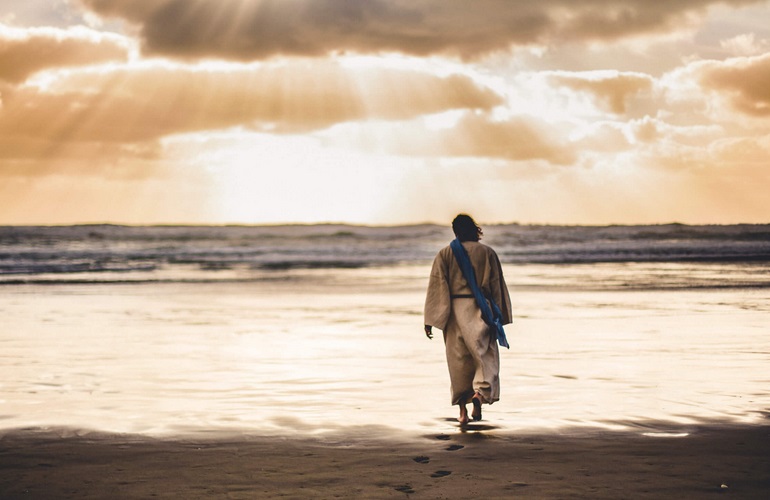In the footsteps of Jesus, the Son of God made Man
Both the first reading (1 Kings 19:16b, 19-21) and Gospel (Luke 9:51-62) of this 13th Sunday in Ordinary Time help us to reflect on the nature and demands of discipleship. Jesus wants to wake us up to this truth that, as disciples, HE is to be the centre of our lives.
Jun 24, 2022

Reflecting on our Sunday Readings with Sr Elaine Wong, IJS
Sunday of Ordinary Time (C)
Readings: 1 Kings 19:16, 19-21;
Galatians 5:1, 13-18;
Gospel: Luke 9:51-62
Both the first reading (1 Kings 19:16b, 19-21) and Gospel (Luke 9:51-62) of this 13th Sunday in Ordinary Time help us to reflect on the nature and demands of discipleship. Jesus wants to wake us up to this truth that, as disciples, HE is to be the centre of our lives.
In the first reading, God directed Elijah to anoint Elisha to succeed him as a prophet. Elisha was initiated first to discipleship — of becoming a servant, which sounds like a prophet in training, then to a full-fledged prophet in God’s time. When Elijah found Elisha ploughing in his field, he threw his cloak over him, a symbol of passing his authority onto him or, as an offering of rapport to mentor him. The call of God came unexpectedly in the mundane of ordinary life and Elisha, being a God-fearing man, perceived it as God calling him to service.
When Elisha asked Elijah to allow him to bid farewell to his parents first, Elijah answered him, “Go, go back, for have I done anything to you?” (1 Kings 19:21) could be paraphrased as “Go ahead. You are free to do as you like.” Elisha then cooked his oxen with the wood from the yoke and plough and joyfully celebrated a farewell feast with his people. Elisha abandoned his livelihood and there was no return to his former way of life. Elisha, in his freedom, chose to leave behind the wealth and security of his family, and followed a life that entails personal sacrifice and service.
In the Gospel reading, Jesus met the three candidates for discipleship on his way to Jerusalem, where he would face his passion and death on the Cross. The Samaritans refused Jesus and his disciples to pass through Samaria to enter into Jerusalem, and John and James wanted to resort to the violent act of calling fire from heaven to teach the Samaritans a lesson. However, Jesus rebuked them, and it is against this background of ethnic conflict, hostility and potential threat to the security of Jesus and his disciples, that Jesus speaks about the radical demands of discipleship. Pride, power and violence have no place in Christian discipleship. The hallmarks of discipleship are humility, obedience, non-violence with acceptance of suffering and the practice of self-denial.
The first volunteer was enthusiastic with seemingly a strong commitment: “I want to follow you wherever you go”. Good as it is, Jesus reminded him that animals in the wild have more security than do Jesus and his followers. Jesus and His disciples stayed in the homes of those who would take them in (Luke 10:6–8). From the crib to the Cross, Jesus “emptied Himself to assume the condition of a slave,” (Philippians 2:7) and, ultimately, death on the Cross. In the same manner, He challenges His disciples that following Him involves letting go of the concern for security, which is one of the basic needs in life.
To another Jesus said: “Follow me,”. This second would-be disciple asked the Lord to allow him to bury his father first. Surprisingly, Jesus said to him, “Leave the dead to bury their dead, your duty is to go and spread the news of the kingdom of God.” Though the burial of one’s parents is an important part of honouring them in accordance with Jewish law (Exodus 20:12; Deuteronomy 5:16), Jesus challenges His disciples — that if He is the centre of their lives, then the mission of proclaiming the Good News is of top priority, and all other matters in life and sacred obligations will have to take second place.
The third volunteer wanted to follow Jesus but wanted to bid farewell to his family first. Jesus said, “Once the land is laid on the plough, no one who looks back is fit for the kingdom of God.” Jesus demands single-mindedness and undivided loyalty. A person preoccupied with his own plan and holding on to any relationship above Jesus is still in control of his own life and not ready to follow Jesus wholeheartedly. So, neither care of self, care for the dead, nor care of one's family can come before the demands of discipleship.
However, the “Yes” to follow Him rests on our inner freedom to make a life-giving response. St Paul, in the second reading, reminds us that as children of God, we live in true freedom, that we do not have to follow the dictates of our worldly ambitions for selfish ends. This freedom in Christ, guided by the Spirit, is the freedom to serve one another joyfully and lovingly. It enables us to give God unreserved commitment to walk in His ways despite trial and tribulations. This freedom, a costly grace, reveals the unconditional love of God incarnated in Christ who dies for us while we are still sinners. (Roman 5:8) To reciprocate this unconditional love of God is to take heed of the advice of Mother Mary at the wedding of Cana: ‘Do whatever He tells you.’ (John 2:5)
“God’s excessive love is our only security”. With these words, Blessed Father Nicholas Barre, the founder of the Sisters of the Infant Jesus, encourages each Sister to walk serenely, lightheartedly and lovingly in the footsteps of Jesus, her beloved.
(Sr Elaine Wong IJS is a creative art practitioner for young people and certified play therapist for children. She is currently engaged in parish faith formation, non-formal education and is a volunteer at Shalom Careline.)







Total Comments:0